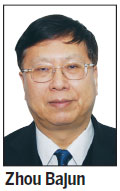The Macao Special Administrative Region (MSAR) is a very small territory with a population of 560,000 living on 31.3 square kilometers of land. But, it is seen by many Hongkongers as a wonderful place which they like to visit. The gambling industry is the backbone of Macao's economy. For many years the city, packed with glitzy casinos, has been dubbed the "Las Vegas of the East". In recent years, it has even replaced Las Vegas as the gambling capital of the world in terms of casino earnings. According to a report in American news magazine Businessweek, the gambling industry contributed $45 billion to Macao's annual revenue in 2013 - compared with Las Vegas' $38 billion.
But on May 25, thousands of Macao residents surprised the outside world by taking to the streets. They were protesting against a bill that would give a retirement package to the city's outgoing chief executive (CE) and top officials. According to the bill, the Macao CE, upon retiring, would enjoy a monthly pension of up to 70 percent of his or her monthly salary as the CE. While the retired top ministers will receive a severance package calculated with a formula which takes the number of months they served in public office multiplied by the sum of their monthly salaries and then multiplied again by a coefficient varying from 0.14 to 0.30 depending on seniority. This sounds like a lot of money for civil servants, but it is really not as impressive as similar retirement packages offered by businesses and private institutions. Who is to say they don't deserve it?

Remember, Macao is a wealthy city. Its per capita GDP is No 2 in Asia and among the top 10 in the world. Macao residents have more entitlements than their Hong Kong counterparts. Every year since 2008 (the ninth anniversary of the MSAR's handover to China) its residents have received a cash handout. Since 2013, the amount paid to every qualified person was increased to 9,000 Macao pataca. No wonder many people outside Macao were surprised by the May 25 protests.
The Macao government responded quickly to the demonstration. On May 26, Chief Executive Fernando Chui Sai-on postponed voting on the bill in the Legislative Council (LegCo) - originally scheduled for May 27. That day, hundreds of Macao residents protested outside the LegCo building. They demanded the government withdraw the bill for good. Facing the biggest demonstrations since the 1999 handover, Chui revoked the bill on May 29.
In terms of modern standards of governance, the Macao government messed up its own record with its handling of this controversial bill. As some critics noted: "How could a government submit a bill to the legislature without first consulting its people?"
This careless mistake exposed chronic problems in the approach of the Macao government - the government has been buying public support with cash handouts instead of winning popular approval with effective social policies. Worse, it has failed to introduce policies to save the economy from over reliance on the gambling industry.
The political situation in Macao is a warning for Hong Kong. Over the past 11 years, Hong Kong has experienced numerous large-scale demonstrations over political, economic and social issues. Although politics has been the main cause of these troubles, as I have previously noted, they have also been caused by a lack of modern governance skills by the Hong Kong government. Hong Kong's second CE, in particular, did not work effectively enough to advance economic and social development. Although he offered each Hong Kong citizen more than HK$1,000 in annual cash handouts for several years in a row, this did not work in his favor.
Current CE, Leung Chun-ying, has been attempting to address some of the problems left by his predecessor. Nevertheless, on May 26, he blundered when he was quoted as saying that a 20 percent cut in mainland visitors was an option being considered by the government. The blunder caused panic on the equities market the next day - as major retail and property stocks fell. This was due to investor uncertainty over a possible sharp drop in mainland visitor spending in Hong Kong. The government lost little time trying to assure the markets. Leung explained publicly that the government was merely "listening to views" on how to deal with the problem of controlling the rising number of mainland visitors.
As I explained in a column on May 14 the Hong Kong government is partly to blame for the negative effects of the recent influx of mainland visitors. Effective measures should be taken to cushion the growing impact on public facilities without seriously affecting the economy. It is a particularly sensitive time in the relationship between Hong Kong and the mainland. A great deal of finesse and sensitivity is required. The SAR government should keep in mind that reducing the inflow of mainland visitors would most certainly hurt the economy. Today, policy-making which is neither feckless nor reckless lies at the heart of good governance.
The author is a veteran current affairs commentator.
(HK Edition 06/05/2014 page9)
